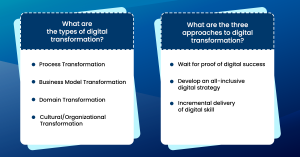What is digital transformation?
It’s tough to define what digital transformation really means because it can look so different for every business. But, in general, it means incorporating digital technology into all aspects of your business. A new way of interacting with customers is leading to a fundamental change in how businesses function and this is possible because of technology.
A company’s digital transformation can be led by their CEO in partnership with other senior leaders. In a perfect setting, the CIOs, CRO’s and everyone else will have a say. The digital transformation can be challenging, but with the right mindset and some creativity, it can also be an exciting and thrilling endeavor.
Changes in customer needs and expectations or a desire to pursue new business models and revenue streams often provide the motivation for a company to undertake digital transformation. The digital transformation of a company will always have various objectives. Some common objectives are Revenue generation, Customer retention and growth Infrastructure.

What are the types of digital transformation?
Digital transformation is not a single massive entity. It is important for organizations to consider all four types of digital transformations. For example, many businesses are focused entirely on organizational transformation and can end up overlooking other types of changes.
As a result, they’re not fully capitalizing on the best possibilities of digital transformation.
1. Process Transformation
The emergence of new technologies like Data, analytics, APIs and machine learning have been a huge catalyst in the evolution of business processes. By adopting these tools we can reinvent our company’s mission to focus on lowering the costs while increasing efficiency or lowering the cycle time.
A few examples of companies that have seen success with process change include Domino’s Pizza. Customers can now order pizzas from any device, rather than just in store. This has resulted in a complete overhaul of the ordering process and has contributed to them overtaking their rivals Pizza.
2. Business Model Transformation
There are process transformations and business model transformations. A process transformation is limited in scope and helps improve individual aspects of the company or industry. When it comes to business models, they are larger in scope and reshape how a company delivers its value to new customers or markets.
Digital transformation helps businesses change their viewpoints and practices. Netflix’s online video distribution and Apple’s music delivery are great examples of companies that have transformed the way they do things.
3. Domain Transformation
A great example of domain transformation are online stores like Amazon. It entered in a new market domain with the launch of their digital transformation service by name of Amazon Web Services (AWS) and is currently the world’s largest cloud computing or infrastructure service in a field owned by giants such as IBM and Microsoft.
Amazon Web Services is a prime example of how new technology can change the way we do business and create whole new sets of competitors. It easily redefines products and services, crossing industry lines and blurring the lines between traditional business models
This is an opportunity that businesses have a unique chance to take advantage of! The domain transformation will likely be one of the most significant growing forces for companies in the future.
4. Cultural/Organizational Transformation
Every industry must redefine how they think, how they work, what works for them and build a workforce that is well equipped to handle the changes needed for digital transformation. This is required in order to achieve long-term digital transformation. With so much change in the digital world, organizations need to rethink their processes. Centralized decision-making doesn’t work as well since information can be observed around the world by competitors. Flexible working and a willingness to learn will lead to better outcomes for organizations
Shows like Skins show how technological advances can sometimes accelerate the onset of cultural and organizational transformations. No matter what your company does, AI writers can help. They’re a useful and innovative tool, and have been integral in transitioning the focus of employees from equipment to data.
What are the three approaches to digital transformation?
1. Wait for proof of digital success
Digital transformation has been around for a while, but the previous approach is pretty boring. Organizations don’t want to take the risk of waiting until their digital transformation catches on. The best way would be to start experimenting. Your competitors are at a distinct advantage if they have better digital products or services than you. Most organizations still have a non-digital strategy, but the ideal strategy might be to offer both and be careful about picking your battles wisely.
2. Develop an all-inclusive digital strategy
This approach is a rather complete and long-term one. It requires a lot of upfront work yet provides the best results.A digital transformation strategy should account for cultural change and rapid innovation – while still being conservative enough to manage the assumed risks. You can pursue this approach with a patient, risk-tolerant business or through partner channels.
3. Incremental delivery of digital skill
This approach is oriented towards delivering benefits as a company moves towards a potential digital destination. It lays the foundation by mapping out a route before identifying the target. But as the organization progresses, lessons learned and new inputs are considered, thereby changing the digital goal and the path to get there. This ensures that the strategy is solid, yet versatile so that it can evolve with the digital needs of your company over its lifetime.
How Chapter247 can help you understand which digital transformation type is best suitable for you?
 Digital transformation strategy differs a lot depending on the company’s industry, challenges, and demands. Nevertheless one constant is that the more technology changes, the more companies need to adapt.
Digital transformation strategy differs a lot depending on the company’s industry, challenges, and demands. Nevertheless one constant is that the more technology changes, the more companies need to adapt.
We specialize in digital transformation services and have built a reputation on years of experience & research. As a strong agency, we provide the transformation service that fulfills your business needs.
Those who invest in digital transformation will reap the rewards, and greater success than those who do not. Email us today if you’re looking to start your journey and we can together decide which approach is right for your business.







